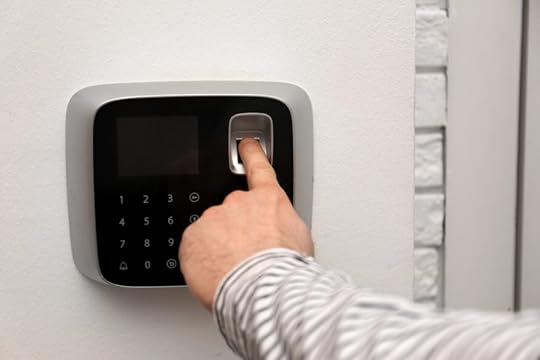What Are the Pros & Cons of Fingerprint Door Locks?

Fingerprint door locks, also known as biometric door locks, have gained popularity in homes and businesses. They offer convenience and security, but they also come with some drawbacks. If you’re thinking about installing one, here’s a look at the advantages and disadvantages.
Pros of Fingerprint Door Locks1. No More Lost KeysTraditional locks require keys, which are easy to misplace. Losing a key can be frustrating and may require changing the entire lock.
With a fingerprint lock, you don’t need to carry keys or worry about replacements. Your unique fingerprint or PIN number is all you need to unlock the door, making access simple and hassle-free.
This is a particular feature I love, because it means less keys to keep up with, and less stuff in my purse or pocket!
2. Quick and Easy AccessFingerprint locks allow for faster entry. You don’t have to fumble with keys or remember codes. A simple scan of your finger is enough to open the door.
This feature is especially useful in emergency situations where quick access is necessary, such as when carrying groceries or entering your home at night.
3. Increased SecurityUnlike traditional locks, biometric door locks can’t be picked easily. They also reduce the risk of unauthorized key duplication. Many models come with advanced encryption to prevent hacking.
Additionally, some fingerprint locks include alarm features that activate if someone attempts to tamper with the lock.
4. Multiple Users Can Be AddedMost fingerprint door locks, like those featured at DaltonLocks, allow multiple users to be registered. This is useful for families, businesses, or shared spaces.
You can add and remove access as needed, which is helpful for rental properties or workplaces with changing staff. Some models also allow you to set time-limited access for guests or service personnel.
5. Smart FeaturesMany biometric door locks connect to smart home systems. Some models include mobile app access, remote unlocking, and activity logs. These features allow you to monitor who enters your home and at what time.
Some locks also integrate with voice assistants like Alexa or Google Assistant.
Cons of Fingerprint Door Locks1. Higher CostFingerprint door locks are more expensive than standard locks. The initial cost of the lock itself is higher, and installation may require professional help, adding to the expense. Some advanced models with smart features can be costly, making them less accessible for budget-conscious buyers.
2. Requires PowerMost biometric door locks run on batteries or electricity. If the battery dies or the power goes out, the lock may stop working. Some models have backup key access, but not all do.
It’s important to check battery life regularly or choose a lock with emergency power options, such as USB charging or mechanical key backups. Also, our door lock will start beeping to warn of if it’s running low.
3. Fingerprint Recognition IssuesWet, dirty, or injured fingers may not be recognized by the scanner. This can cause inconvenience, especially in bad weather or if the sensor gets damaged.
Some locks come with backup methods like PIN codes or keycards, but not all models offer this option. If multiple recognition failures occur, it could lock you out of your own home.
This is why I would always recommend getting one with a PIN pad backup option! And be sure your finger is clean and dry before trying to scan it.
4. Possible Hacking RisksWhile fingerprint locks are more secure than traditional ones, they are not 100% foolproof. Hackers could potentially bypass the system, especially if the lock connects to Wi-Fi.
Additionally, poorly made fingerprint scanners may store fingerprints in a way that is vulnerable to breaches. Choosing a lock with strong encryption and security measures is crucial.
5. Installation Can Be ComplicatedSome biometric door locks require professional installation. If you’re not tech-savvy, setting up and troubleshooting the device might be challenging. Certain models require drilling or adjustments to your existing door, which could make installation more difficult. Additionally, software updates and firmware maintenance may be needed to keep the lock functioning properly.
Should You Get a Fingerprint Door Lock?Biometric door locks provide convenience and advanced security features. However, they also come with potential issues like cost, power dependency, and occasional recognition failures. If you want keyless access and are comfortable with technology, a fingerprint lock could be a great choice. But if you prefer a simple, reliable locking system, you might want to stick with traditional locks.
Before making a decision, consider your budget, security needs, and how comfortable you are with smart technology. A fingerprint door lock can be a valuable upgrade, but it’s important to weigh both the pros and cons before installing one.
The post What Are the Pros & Cons of Fingerprint Door Locks? appeared first on Geek Mamas .



